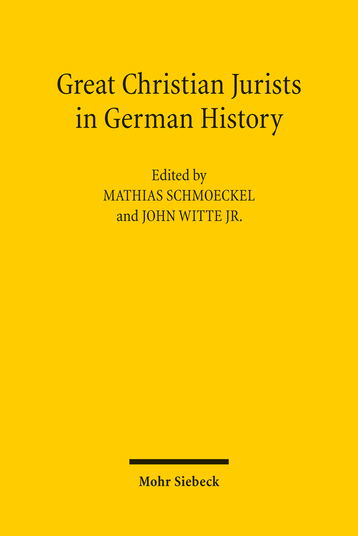
Great Christian Jurists in German History
Mathias Schmoeckel and John Witte, Jr.
This volume is part of a 50-volume series on “Great Christian Jurists in World History, “presenting the interaction of law and Christianity through the biographies of 1000 legal figures of the past two millennia. Commissioned by the Center for the Study of Law and Religion at Emory University, each volume in this series focuses on a specific country, region, or era, and it samples the life and work of a score or more of its greatest legal minds over the centuries. These legal minds include not only civil and canon lawyers and judges but also theologians, philosophers, and church leaders who contributed decisively to legal ideas and institutions, or who helped create landmark statutes, canons, or cases. Thus, familiar Christian jurists like Gratian, Grotius, Blackstone, Kuttner, and Scalia appear in this series, but so do Augustine, Isidore, Aquinas, Calvin, Maritain, and Romero. This biographical approach is not intended to deprecate institutional, doctrinal, social, or intellectual histories of law, nor will it devolve into a new form of hagiography or hero worship of dead white males. It is instead designed to offer a simple method and common heuristic to study the interaction of law and Christianity around the world over the past two millennia.
Columbia University Press opened this series in 2006 with a three-volume work on Modern Christian Teachings on Law, Politics, and Human Nature, featuring thirty modern Catholic, Protestant, and Orthodox Christian figures. Cambridge University Press has new titles on great Christian jurists in the first millennium, as well as in English, Spanish, French, Lowlands, and American history. Routledge is taking up the Italian, Nordic, Russian, Welsh, and Latin American stories; Mohr Siebeck the German story; Federation Press the Australian story. Forthcoming titles will cover great Christian jurists in the history of Scotland, Ireland, Austria, Switzerland, Greece, and various countries and regions in Eastern Europe, the Middle East, Africa, and Asia.
An Introduction and Overview by the editors
Mathias Schmoeckel and John Witte, Jr.
A century and more ago, the historical interaction of law and Christianity was a scholarly commonplace in Germany. Indeed, great German professors led the world in producing critical editions of thousands of historical texts of law and theology, establishing pathbreaking journals like the Zeitschrift für Rechtsgeschichte, and producing vast historical studies of the interaction of law and Christianity over the prior two millennia. German universities were home to such scholarly legal giants as Friedrich Carl von Savigny, Otto von Gierke, Roderich von Stintzing, Ernst Landsberg, Theodor Muther, Adolf von Harnack, Theodor Mommsen, Rudolph Sohm, Wolfgang Kunkel, Eduard Schmidt, Emil Sehling, and so many others. And German scholars in other fields, such as Wilhelm Dilthey, Max Weber, Ernst Troeltch, and many others, also offered compelling accounts of the interactions of law, religion, society, and politics in German history.
Today, by contrast, most German scholars and students lack a deep understanding or appreciation of this history of law and Christianity. Not since Erik Wolf’s classic text, Grosse Rechtsdenker der deutschen Geistegeschichte (4th ed. 1963) has there been a thorough investigation into the influence of Christian theology on German legal thinkers throughout the centuries. While some scholars of late, animated in part by the five-hundredth anniversary of Luther’s Reformation in 2017, have studied Protestant influences on law and politics, the scholarly study of the millennium-long canon law tradition in German history, or the influence of Christianity on discrete areas of public, private, penal, and procedural law has become almost irrelevant for all but specialists. Ironically, Germany, once the world’s leader in the scholarly study of law and Christianity, has now largely lost its capacity to research even its own Christian traditions and their legal influence. And the few bold attempts to do so of late have garnered little public interest, sympathy, or funding, and sometimes have met with considerable opposition.

This volume on Great Christian Jurists in German History aims to restore and expand on this once proud German tradition of scholarly study of law and Christianity. This volume presents 26 major German legal scholars from the Middle Ages until today and analyses the influence of Christianity on their lives and legal work and sketches their enduring influence on the laws of church and state. Featuring freshly written chapters by a score of leading scholars, mostly from German universities, this is the first overview in English of the relationship of Christianity and German law in the second millennium. Included are studies of both famous and long forgotten Catholics and Protestants, and both martyrs and collaborators with Nazism and earlier forms of state autocracy.
It proved hard to press this vast topic into a single volume, and to sort out the basic parameters of this study. The “Christian” jurists who appear herein are largely Roman Catholics, Lutherans, and Calvinists, who dominate German legal history. The “jurists” we chose include not only law professors, lawyers, or judges, but also philosophers and theologians who shaped the law and legal theory of church and state. Their “greatness” in German legal history does not always mean that they were popular in their day – especially those who criticized or dissented from momentous events like the Reformation and Counter-Reformation, the rise of Prussian absolutism, and the outbreak of National Socialism and Nazism. And “German” jurists are not necessarily those who wrote in German or regarded themselves as German. Since Latin remained the dominant academic and diplomatic language until the nineteenth century, most of our figures wrote in Latin. While we chose our figures from territories which belong to Germany today, this does not mean that these lawyers necessarily felt “German” in their time. Those working in the Saxon tradition might have been aware of their Germanic heritage, but they tended to view themselves primarily as members of the great Saxon legal tradition. In this respect, “German” as a criterion is less apt to describe the way these authors regarded themselves.

With those criteria in mind, the editors and contributors made their selections of biographical case studies for this volume. From the medieval period, we selected four figures: Eike von Repgow, who gained his expertise in his position as a judge; Johannes Teutonicus, an early exemplar of the learned tradition, particularly on canon law; Albertus Magnus, a philosopher who established some of the main ideas of natural law theory; and Johann von Buch, an early example of a medieval German lawyer trained at the University of Bologna. For the Reformation and Counter-Reformation era, we setted on Johann Oldendorp as one early example of a leading Lutheran lawyer with a suitable Catholic counterpart in Andreas Gaill. Authors from the seventeenth and eighteenth centuries, particularly of the Saxon tradition, take up a substantial place in the middle of the volume: Dominicus Arumaeus, Samuel von Pufendorf, Benedict Carpzov, Gottfried Wilhelm Leibniz, and Christian Thomasius [Boehmer] could not be omitted, even though they constitute a dominating Lutheran block. With the crypto-Calvinist Johannes Wesenbeck, from Wittenberg, and the more outspoken Calvinist Johannes Althusius, we have at least a Reformed counterpart. The new, predominant Prussian tradition is represented by Carl Gottlieb Svarez, Friedrich Karl von Savigny, Karl Friedrich Eichhorn, Moritz August von Bethmann-Hollweg, and Friedrich Julius Stahl, while Sylvester Jordan and Max von Seydel represent Roman Catholic counterparts. The reaction to Nazism is reflected in the biographies of a Protestant martyr like Eugen Bolz, Roman-Catholic lawyers like the politician Konrad Adenauer, the jurist Hans Nawiaski, and the great canonist and émigré scholar Stephan Kuttner.
While we deliberately included less famous jurists, some of them, we hope, will become better known through this volume. Most readers will hardly know of Sylvester Jordan, but might realize now why the law faculty of Munich recently put his name on its award for the best dissertation. Other lawyers are famous in Germany but unknown by English and American historians. With regard to the politics of Emperor Louis IV, for example, William of Ockham and Marsilius of Padua of his court in Munich are well known, but the great and original lawyer Johann von Buch, the leading lawyer of Brandenburg in the service of the emperor’s eldest son, has been ignored, although he had highly original views on the legal topics of the day. This publication may help, therefore, to properly elevate the stature of some historical German jurists.
Hundreds of additional eminent legal scholars in German history, many devout Christians among them, could have been included in this volume. And not all criteria for selection apply equally to those whom we selected. Nobody can doubt the preeminent importance of Savigny, for example, in German legal history, but he certainly was not known until recently for his specifically Christian perspective; even his confessional identity was hardly known in his own day. Many of our figures, chosen for their originality or prescient insights, could have been replaced by more celebrated lawyers or more famous Christians of their day. We had to make judicious selections of illustrative figures over a millennium, knowing that a single collection like this can never represent the German history of law and Christianity in all its multifold perspectives in a systematic or comprehensive manner. In this respect, this collection is a first attempt, which will be successful if it results in encouraging more research along these lines. ♦

Dr. Mathias Schmoeckel is the Executive Director of the Institute for German and Rhenish legal History and Civil Law. In addition to his work in German legal history, his research focuses in law and religion, the history of international law.

John Witte, Jr., JD (Harvard); Dr. Theol. h.c. (Heidelberg), is Robert W. Woodruff Professor of Law, McDonald Distinguished Professor of Religion, and director of the Center for the Study of Law and Religion at Emory University. A specialist in Legal History, Human Rights, Religious Freedom, Marriage and Family Law, Law and Religion, he has published 280 articles, 17 journal symposia, and 35 books.
Recommended Citation
Schmoeckel, Mathias and John Witte, Jr. “Great Christian Jurists in German History – An Introduction and Overview by the editors.” Canopy Forum, July 16, 2020. https://canopyforum.org/2020/07/16/great-christian-jurists-in-german-history/

